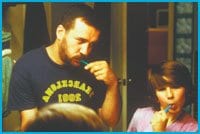Bear Cub, directed by Miguel Albaladejo, is an ambitious and ultimately rewarding new Spanish film about a popular, professional Madrid bear who must make room in his life for his sister’s young son when she is detained on drug-trafficking charges.
Pedro (Jose Luis Garcia-Perez) is a dentist with a very active sex life and a lover named Manuel (Arno Chevrier) who lives in Paris. His sister Violeta (Elvira Lindo) is an exuberantly queer-positive, motor-mouth flake who leaves her nine-year-old son Bernardo (David Castillo) in her brother’s care for a couple of weeks while she travels with her newest hippie boyfriend. While both are initially apprehensive, but by no means hostile, Pedro and Bernardo become very close, in no small part due to young Bernardo’s obvious sensitivity, precociousness and proto-gay sensibilities.
The issue of young Bernardo’s potential queerness is discussed frankly and with plenty of humour throughout the film. While he doesn’t know if he is gay yet – his mother has been encouraging him to be since birth – he asks other kids he meets if they are gay, and he is pleased to spend the evening partying with a den of Pedro’s chunky and hunky bear friends. It is a bit disappointing that we don’t see more of the bear social scene (outside of a few get-togethers) once the parenting plot takes centrestage: Violeta has been indefinitely imprisoned in India and Bernardo’s stay becomes long term. Similarly, Pedro’s “friend” Manuel, a major character in the first half, is nearly dropped entirely from the second. While it fits the narrative – Pedro enjoys the independence of being a free-wheeling bachelor and must also adjust to parenting Bernardo – Manuel is a great presence, full of warmth, and we quickly notice his absence, especially since he was supposed to move to Madrid.
Despite the melodramatic revelations that soon pile up resulting from Bernardo’s paternal grandmother (Empar Ferrer) seeking custody, the basic central relationship between a gay man and an adoptive son stays emotionally resonant.
The film’s greatest success is its complex protagonist who enjoys lusty threesomes (as seen in the opening credits) while also being perfectly capable of raising a child under the same roof. It never plays it safe by pandering to the homophobic terror that proximity to a parent’s promiscuous gay sex life can only be traumatizing for children. Meanwhile, Castillo’s performance as young Bernardo is a model of restraint and nuance. They make a great pair.


 Why you can trust Xtra
Why you can trust Xtra


